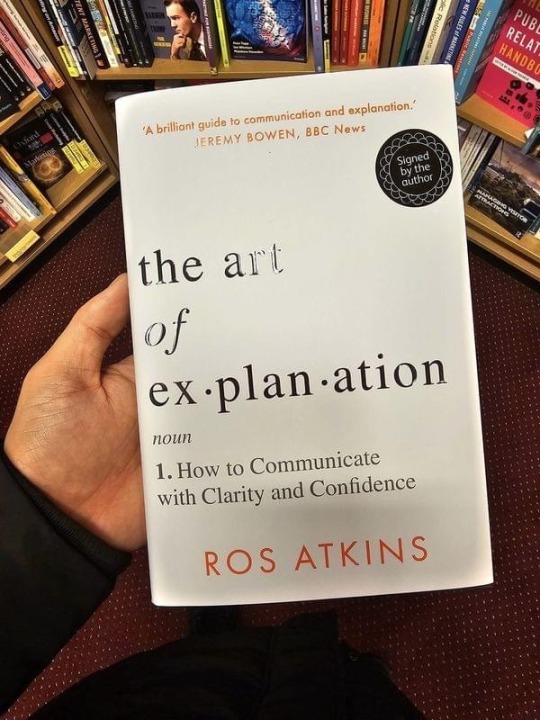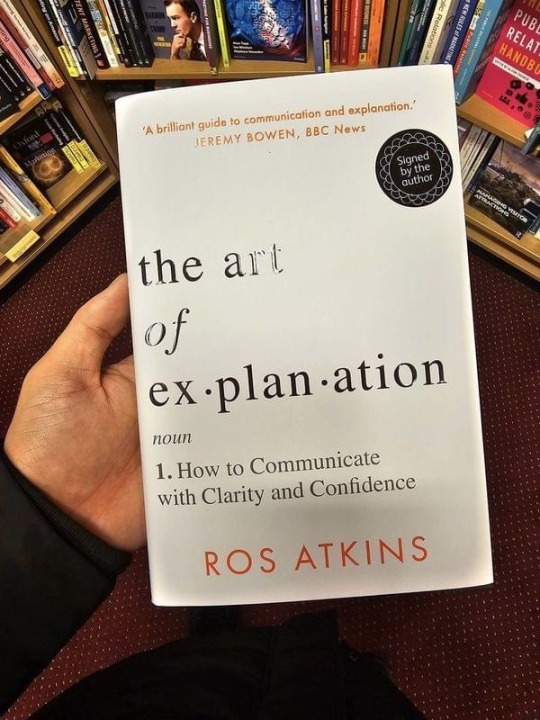Text
"The Art of Explanation" by Ros Atkins offers invaluable insights into effective communication.
Here are ten detailed lessons from the book:
1. Know Your Audience: Understanding who you're speaking to is fundamental. Tailor your explanations to their level of knowledge, interests, and concerns. Use language and examples they can relate to.
2. Clarity is Key: Strive for simplicity and clarity in your explanations. Break down complex ideas into digestible chunks. Avoid jargon and unnecessary technical terms that might confuse your audience.
3. Tell a Story: Stories are powerful tools for communication. Weave narratives into your explanations to engage your audience emotionally and help them connect with the information on a deeper level.
4. Use Analogies and Metaphors: Analogies and metaphors can make abstract concepts more concrete and understandable. Find familiar experiences or objects that parallel the ideas you're trying to convey.
5. Visual Aids Enhance Understanding: Incorporating visual aids such as diagrams, charts, or slides can greatly enhance understanding. Visual representations complement verbal explanations and appeal to different learning styles.
6. Repetition Reinforces Learning: Repetition is essential for learning and retention. Repeat key points throughout your explanation to reinforce understanding. However, vary your presentation to prevent monotony.
7. Invite Interaction: Encourage questions and feedback from your audience. Interactive discussions foster engagement and allow you to address misunderstandings or clarify points in real-time.
8. Be Authentic and Genuine: Authenticity builds trust and credibility. Be genuine in your communication, admitting when you don't know something and being open to learning from your audience.
9. Practice Active Listening: Effective communication is a two-way street. Practice active listening by paying attention to your audience's reactions and adjusting your communication accordingly. Empathize with their perspectives and concerns.
10. Continuously Improve: Communication is a skill that can be honed over time. Reflect on your past explanations, seek feedback, and actively work on improving your communication skills through practice and learning from others.
"The Art of Explanation" underscore the importance of clarity, empathy, and engagement in effective communication, offering practical strategies for becoming a more persuasive and impactful communicator.
BOOK: https://amzn.to/4d07n3y
For FREE, you can listen to the audiobook when you sign up for the Audible Membership Trial using the same link above.

1 note
·
View note
Text
22 days more left to go, and we're officially a year old single. Though you have already found the love of your life after 3 months we broke up. Somehow I can't bear the fact that I still get to remember the old days together with you, and I just want you to know that you're the best thing that ever happened to my life and I am thankful to the one who enabled all things to happen for our good. Where you are right now together with the love of your life, may it be that He gave you the things that I haven't given to you and somehow filled the gap that I have left to complete you, and now I can see that you've found the one perfect for you. And I'm happy for you. However this thought of mine will remain here, and it will only be a memory of the past. I'll continue to pursue my dreams and hopefully, you'll pursue your dreams too with the love of your life.
0 notes
Text
In every heartaches, He is still worthy to be Praised. And so let your will be Done, O’ God. For it is well with my soul.
0 notes
Text
Praise the Lord O’ my soul. All My inmost being.
Can I talk to God when I’m angry? -yes
Can I talk to God when I’m having doubts?- yes
Can I talk to God when I’m alone?- yes
Can I talk to God at school?- yes
Can I talk to God at work?- yes
Can I talk to God when I’ve just sinned?- yes
Can I talk to God when I feel I’m about to sin? -yes
Can I talk to God when I am in sin?- yes
Can I talk to God when I’m crying?- yes
Am I ever to dirty for God? -No
"Philippians 4:6 - Do not be anxious about anything, but in every situation, by prayer and petition, with thanksgiving, present your requests to God."
1K notes
·
View notes
Text
i think of you somehow, but maybe I'm just a nuisance.
"i wonder if we ever think of each other at the same time."
64K notes
·
View notes
Text
7 Lessons From Ros Atkins's book "The Art of Explanation: How to Communicate with Clarity and Confidence"
1. Audience Awareness:
Understanding your audience is key to crafting an effective explanation. It's not just about their existing knowledge of the topic. Consider their age, background, expectations, and potential biases. Tailor your language and complexity to their level, pique their interest by highlighting why the topic matters to them, and acknowledge any preconceived notions they might hold to build a stronger foundation for your explanation.
2. Information Gathering: Not Just Research
While research is crucial for a solid explanation, go beyond traditional methods. Consider incorporating your personal experiences with the topic, seek insights from experts directly involved, and explore opposing viewpoints to build a well-rounded understanding and address potential challenges in your explanation.
3. Prioritization and Clarity
The art of distillation lies in extracting the most crucial points and discarding unnecessary details. Identify the core message you want to convey, prioritize supporting points based on their relevance, and use real-world applications or examples to illustrate complex ideas and ensure clarity.
4. Structure for Understanding
Logical flow is the structure that guides your audience's understanding. Think of it as building blocks. Use chronological order for sequential processes, explain cause and effect relationships to show connections, or frame your explanation around a central problem and its solution to create a clear path for your audience to follow.
5. Connecting the Dots: Weaving a Cohesive Narrative
Don't just present facts in isolation. Weave a cohesive narrative by using transitions and clear signposts to guide your audience through the connections being made. Summarize key points regularly to reinforce understanding and show progress throughout your explanation.
6. Conciseness is King: Editing for Impact
A tight and concise explanation delivers a stronger punch. Eliminate redundancy by avoiding repetitive phrasing, vary your sentence structure to keep your audience engaged, and use active voice for a more impactful message.
7. Confident Delivery:
Confidence in your explanation goes beyond your words. Maintain good posture and eye contact to project assuredness, modulate your tone to emphasize key points and avoid monotony, and practice your explanation beforehand to feel comfortable and polished.

0 notes
Text
Your brain is a supercomputer.
Update its software:
- Books
- Podcasts
- Practical experience
Clean its hard drive:
- Walks in nature
- Journaling
- Self-talk
Protect its battery:
- Sleep 8 hours
- Healthy diet
- Proper rest
1 note
·
View note
Text
10 Lessons From "Focus on What Matters" by Darius Foroux:
1. Identify your priorities: Take the time to reflect on what truly matters to you and what you want to achieve in life. This clarity will help you make better decisions and allocate your time and energy effectively.
2. Eliminate distractions: Minimize or eliminate distractions that hinder your focus and productivity. This includes reducing time spent on social media, turning off notifications, and creating a conducive environment for deep work.
3. Practice essentialism: Embrace the concept of essentialism, which means focusing on the vital few things that bring the most value and impact to your life. Say no to non-essential tasks and commitments.
4. Set clear goals: Define clear and specific goals that align with your priorities. This will help you stay focused and motivated, as well as measure your progress along the way.
5. Develop a routine: Establishing a daily routine can help you create structure and consistency in your life. It allows you to allocate time for your priorities and reduces decision fatigue.
6. Embrace minimalism: Simplify your life by decluttering physical possessions, digital clutter, and unnecessary commitments. This will free up mental space and allow you to focus on what truly matters.
7. Practice mindfulness: Cultivate mindfulness by being fully present in the moment and paying attention to your thoughts, emotions, and surroundings. This helps you stay focused and make intentional choices.
8. Prioritize self-care: Take care of your physical and mental well-being. Prioritize activities like exercise, proper nutrition, quality sleep, and relaxation to maintain your energy and focus.
9. Learn to say no: Be selective about the commitments and opportunities you take on. Saying no to non-essential tasks or requests allows you to protect your time and focus on what truly matters.
10. Continuously evaluate and adjust: Regularly review your priorities, goals, and commitments. Adjust as needed to ensure you stay aligned with what truly matters to you.
2 notes
·
View notes
Text
Well, it is what it is, I guess it's not yet my time to enter into the professional world, maybe because there's still more to learn while being unemployed, still I thank God for this life. He is still worthy to be praised in every circumstance.
0 notes
Text
Dear Adrian, Don't be too hard on yourself, everything is going to be worth it in God's perfect time. I know you've been through a lot, You're unemployed, you don't have any illegibility to work and have a regular job and earn for yourself and for your parents, to save up and get the things that you want, and you see your classmates or batchmates are getting the things they wanted, nevertheless take heart and trust in Him who has brought you this far. God enabled you to finish College, therefore He will carry you out of everything through His will be done. Just be grateful in every circumstance, and just try to be better in preparing for the next exam and be more focused on building yourself up and being who God wants you to be in this life that is full of challenges, now that you've realized that being in a relationship can wait till you're settled down and have a stable job, keep doing what you've been doing and improve for yourself, and do all the things as if you're serving the Lord in 1 Corinthians 10:31. Lastly, as the Apostle Paul told the Christians in Philippi, "Rejoice in the Lord always, again I will say Rejoice!" (Philippians 4:4) Rejoice in any circumstance Because the Lord is always good and has been good to you from the beginning of your life.
Padayon, Engr. Adrian Christian F. Ampong
0 notes
Text
Reminder to self:
7 powerful lessons from the book "How to Finish Everything You Start"
1. Prioritize ruthlessly: Don't try to do everything at once. Identify your core values and goals, then focus on completing tasks that align with those priorities. Learn to say no to commitments that don't fit your priorities.
2. Break down big tasks into small, actionable steps: Overwhelming tasks can be paralyzing. Break them down into smaller, more manageable chunks. This makes them seem less daunting and helps you stay motivated as you see progress.
3. Master time management: Implement strategies to utilize your time effectively. Set realistic deadlines, schedule tasks strategically, and minimize distractions. Consider tools like time tracking apps and to-do lists to stay organized.
4. Embrace a growth mindset: View challenges as opportunities to learn and grow. Don't be afraid to make mistakes; see them as stepping stones on your path to success. Celebrate your progress, no matter how small, and learn from setbacks.
5. Cultivate self-care: Prioritize your well-being. Get enough sleep, eat healthy foods, exercise regularly, and engage in activities you enjoy. Taking care of yourself will give you the energy and focus you need to finish what you start.
6. Delegate and collaborate: Don't be afraid to ask for help. Delegate tasks when possible and leverage the expertise of others. Collaboration can not only lighten your workload but also bring fresh perspectives and accelerate progress.
7. Reflect and adjust: Regularly evaluate your progress and adjust your approach as needed. Learn from your experiences and identify areas where you can improve. Don't be afraid to change your plans if they're no longer serving you effectively.
1 note
·
View note
Text
For how many times Have I broken your heart O’ God, forgive me for I have sinned against you.
0 notes
Text

I have loved you, but my love was not enough for you. I’ll always treasure the memories we have made together.
Hopefully you would still live the life God wants you to be and if it is His will for us to reconnect to each other, then let it be done, but before that; we should reconnect to Him first who enabled us to connect for 10months.
1 note
·
View note
Text
I should've done what I was suppose to do when I was still in Highschool, which is to be better in studying and having a study habit, and I should've discovered more about what I'm truly good at.
In short, I should've been better as a student. But being a student doesn't stop in Highschool or College, its always a lifetime to learn and be a student to become a professional in every aspects in our individual lives.
3 notes
·
View notes
Text
Regret?
Well, I just got a new girlfriend and She's way more better and hotter than all the girls I dated or somehow fling with, nevertheless I guess I got no room for regrets in this relationship now since I love her that much,
but what I have in mind is the fact that as a Christian, hoping to be a Man of God who somehow has to protect Her purity, not compromise it and I don't want to hurt her feelings by saying that I have regretted my decision of doing the "thing" that usually married couples do.
What's insane is that; I am the one who said to Her the time we got to a certain place where we can talk heartily and honestly to each other that I would never compromise Her purity, and Here I am doing it, would that make me a less of a person? I guess we both have the same question in mind that she somehow asked me, I couldn't ask her the same thing.
I don't wanna repeat the same mistakes again of my past relationship, hopefully we can resist temptations along the way this time by the Grace of the Lord, I know I became a hypocrite by not staying true or being honest to my words, and I leave this thought behind here.
0 notes